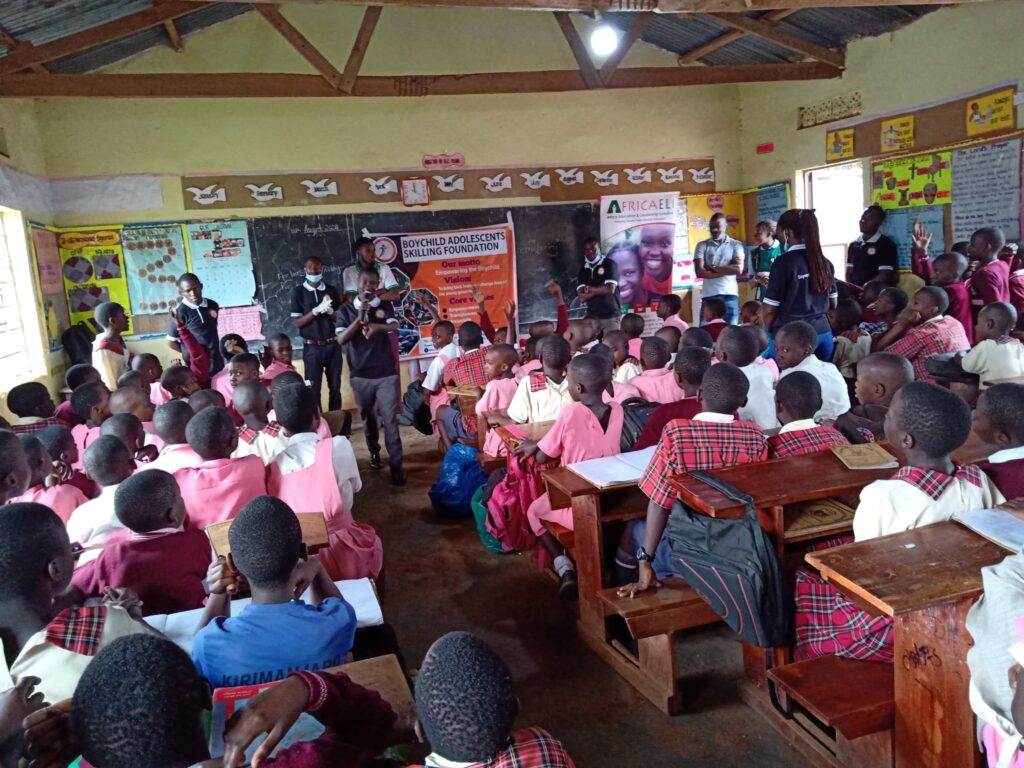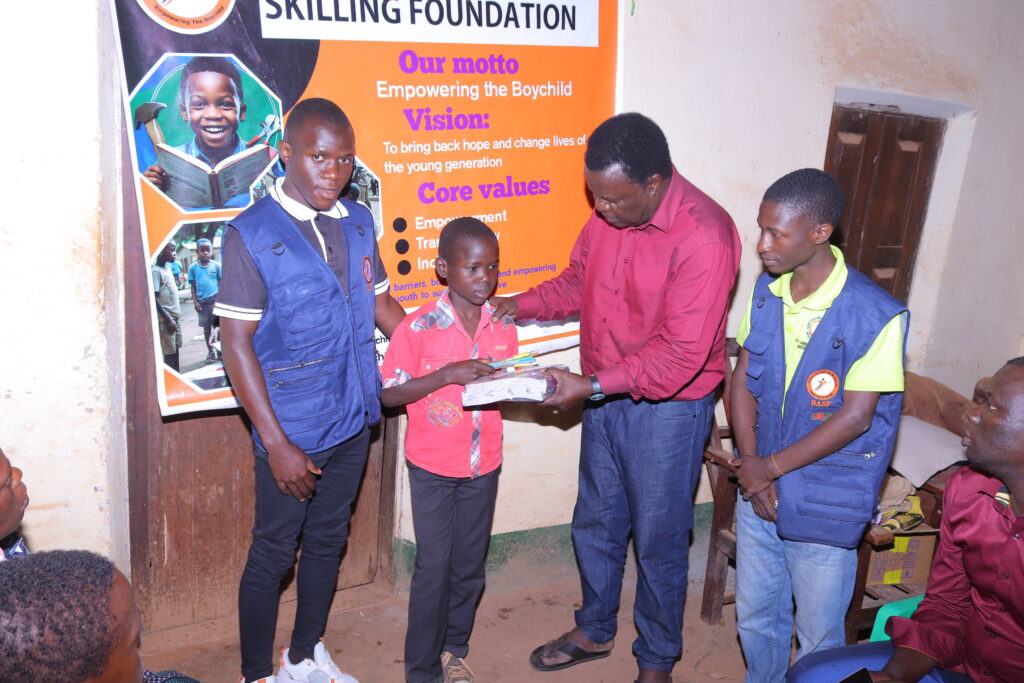Uganda has made remarkable progress in advancing girls’ and women’s empowerment, promoting their rights in education, leadership, and health. However, amidst this critical work, boys have been gradually sidelined –often assumed to be self-reliant and emotionally immune. As a result, many boys in Uganda today are falling through the cracks, facing neglect, emotional isolation, and limited support.
To address this growing imbalance, BOCASIF International was founded. The organization’s mission is to uplift and support boys through mentorship, skills training, emotional development, and community education. BOCASIF’s work does not seek to replace or compete with efforts to empower girls but to complete the picture of inclusive, gender-balanced development. “A balanced society needs both genders supported equally,” says Muhammadi Ssemmanda, the founder and Executive Director of BOCASIF, a recently joined MenCare partner.
The Alarming Gender Disparity in Uganda’s Prisons
As of 2024, Uganda’s prison population stood at more than 76,000 inmates, with males accounting for a staggering 95.2 percent, according to data from the Uganda Prisons Service. Naguru Remand Home, a juvenile facility in Kampala, reflects this reality – where more than 90 percent of its detainees are boys.
Globally, the trend is similar. According to the 2024 World Prison Population List, men constitute more than 93 percent of prisoners worldwide. These statistics reveal a deep-seated problem: the boy child is in crisis, and society is not responding adequately.

Education and Emotional Disengagement
In our education system, the situation is equally troubling. Boys are increasingly dropping out of school, with girls outperforming them in national examinations. As Hon. Janet Museveni, Uganda’s Minister of Education and Sports, asked in February 2024 during the National Education Stakeholders’ Forum New Vision (2024): “Why is the boy child not completing primary education?” The question reflects growing concern over male underachievement in a society where boys are expected to fend for themselves emotionally and socially. This trend not only limits boys’ future prospects but also perpetuates cycles of poverty and social instability. Many boys face compounded challenges such as economic hardship, lack of mentorship, and societal pressures to enter the workforce prematurely. Without targeted interventions, they are more likely to disengage from learning, fall into risky behaviors, or struggle with unemployment in adulthood. Addressing this crisis requires a holistic approach that combines academic support, life skills training, and emotional guidance to ensure boys remain in school and are empowered to reach their full potential.
Without proper mentorship, many boys retreat into isolation or end up engaging in destructive behaviors including substance abuse, street life, and even crime. BOCASIF exists to break this cycle.
Changing the Narrative
BOCASIF provides boys with safe spaces where they can access emotional support, mentorship, and practical skills. Through partnerships with schools, faith-based organizations, and local councils, the foundation implements outreach programs that not only empower boys but also educate the broader community about their needs.
These safe spaces become more than just physical locations; they serve as hubs of trust, growth, and transformation. Here, boys find a listening ear, engage in constructive activities, and build lifelong friendships grounded in respect and shared goals. By creating an environment where they feel valued and understood, BOCASIF helps them develop the confidence to navigate life’s challenges and the empathy to positively influence those around them.
The organization takes a holistic approach addressing emotional, educational, and societal gaps simultaneously. Its leaders, programs, and community advocates are committed to reshaping how boys are raised and supported.
Magala Allan, Head of Programs at BOCASIF, says the solution starts with emotional healing: “We help boys open up emotionally. Suppressed feelings often turn into violence or depression. Through mentorship and values-based training, we help them deal with life constructively.”
Nalubega Laila Musa, BOCASIF’s General Secretary, advocates for gender-responsive education policies. “We must acknowledge that boys and girls face different challenges. Our schools and communities must reflect this in how they support each child. Gender equality must include boys, too.”
Among BOCASIF’s strongest community voices is Sheikh Musa Gwamba, Imam of Mukono Central Mosque and a dedicated BOCASIF advocate. He is a key partner in sensitizing communities and mentoring boys through faith-based dialogue. “Boys need structured guidance,” he says. “Over-pampering weakens them, but leaving them to struggle alone breaks them.”
Another vital voice is Susan Nakimbugwe, a mother of five boys and a community-based BOCASIF advocate in Wakiso District. Her home has become a model for balanced parenting and gender respect. “I adopted a girl to teach my sons how to live respectfully with women. Boys often run to the streets because they lack emotional support. Girls seek it in relationships. Both are reacting to emotional gaps at home.
Equally inspiring is John Ssenyonga, a youth mentor from Luweero who grew up facing the very challenges BOCASIF seeks to address. Having once battled peer pressure and the absence of a father figure, John now channels his experiences into guiding boys toward resilience and purpose. “I tell them, your circumstances do not define your future,” he shares warmly. “What matters is the choices you make and the values you hold on to. When boys see someone who has walked their path and found a better way, they begin to believe they can too.”

Three-Pronged Strategy
Through this integrated approach, BOCASIF ensures that boys are not only equipped with the tools to succeed but are also surrounded by a supportive network that reinforces positive values. Each pillar complements the others – mentorship builds character, skills training opens opportunities, and community sensitization creates an environment where these gains can thrive. This synergy helps break cycles of neglect, unemployment, and harmful gender norms, paving the way for well-rounded, confident young men who contribute meaningfully to their families and society.
BOCASIF implements a focused three-pillar approach:
- Mentorship: Providing boys with positive male role models who offer guidance and support.
- Skill-Based Empowerment: Teaching vocational and entrepreneurial skills to foster independence.
- Community Sensitization: Engaging parents, educators, and religious leaders to transform outdated views on masculinity.
Supporting boys is not a secondary issue – it’s a national imperative. Uganda’s future depends on raising emotionally balanced, educated, and empowered boys who grow into responsible men. BOCASIF calls on policymakers, development partners, educators, and parents to join hands in creating a more inclusive approach to gender equity.